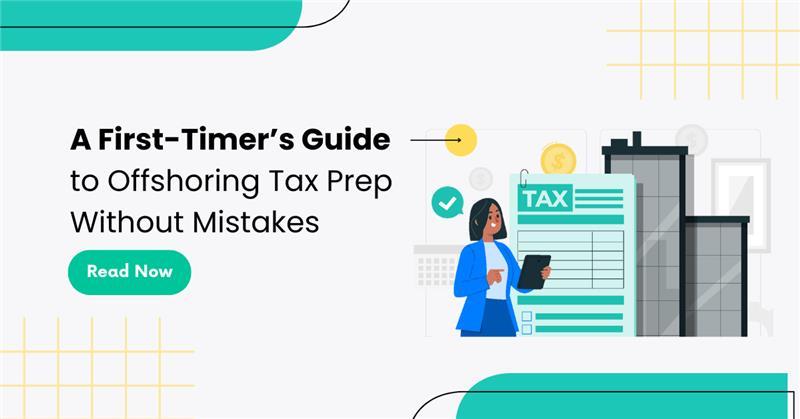
22 Accounting Social Media Posts for Firms (That Aren’t Boring)
Still posting boring “get your books done” posts for marketing for CPA firm? STOP. Get inspiration for accounting social media posts that work + post angle inside

Taking a leap towards offshore tax preparation can be filled with both exciting advantages and potential pitfalls. Yet, the lingering uncertainty about whether it’s the right move for your tax firm keeps many from making the move.
When offshoring doesn’t work, it’s rarely one-sided. The challenges often stem from both the tax firm and the staffing partner.
In this blog, we’ll explain exactly where things can go wrong—and more importantly, how to avoid those mistakes.
If you’re considering offshoring for the upcoming tax season, this is a must-read. Stick with me till the end—you might just find the clarity you’re looking for.

The biggest issue with the offshore accounting market is how it’s positioned as just a way to cut costs. This leads many tax firms to focus solely on finding the cheapest option available.
Yes, offshore rates can go as low as $6/hour, but at such low rates, you’re unlikely to get a skilled resource. Even in India, where many offshore teams are based, $5/hour is below standard wages for qualified tax professionals.
While it’s true that offshoring can get you equally skilled employees at a fraction of the cost, cost alone shouldn’t drive your decision. A reliable offshore tax preparation team is an investment in your firm’s efficiency, client satisfaction, and long-term success—not just a line item on your expense sheet.
Tax Firms that make decisions based on the cost are the same one’s letter on complaining on Reddit about reworking the work of their offshore accounting team.
Not signing a retainer with your offshore tax team? Big mistake.
Here’s why: a retainer is your formal guarantee—a commitment that ensures a set number of hours (whether 40, 80, or 200 a week) are exclusively reserved for your work. The safety net keeps you covered when work piles up unexpectedly.
But here’s where tax firms often trip up: they hesitate to lock in retainers, thinking, “I don’t need the guaranteed hours right now.” Sounds reasonable—until you find the perfect offshore team, don’t sign a retainer, and then get hit with a surge of work (a common thing that can happen in tax season).
Without that retainer, the team you need is likely already committed elsewhere, leaving you scrambling.
Offshoring already saves enough to justify hiring in advance, ensuring you’re ready for growth and peak demand. Think of a retainer as a proactive investment—not just in securing skilled resources but in your peace of mind during busy seasons. Because when tax season hits, the last thing you want is to be caught short-handed.
Before starting to look for an offshoring tax prep and review partner, it’s crucial to assess your tax firm’s readiness. Not every firm is equipped to handle offshoring effectively—it requires more than just intent; it requires structure.
Here’s a quick readiness checklist to help you evaluate:
A. Delegation Skills: Is the tax firm owner comfortable handing off work and trusting others to execute? Delegation is non-negotiable.
B. SOPs in Place: Do you have clear, documented processes? Standard Operating Procedures (SOPs) streamline workflows and ensure smooth communication between teams.
C. Tech Infrastructure: Tools like TaxDome or similar platforms are essential to track and manage offshore work seamlessly.
D. Onshore Team Alignment: Is your onshore staff aligned and supportive of the offshoring decision? Without their buy-in, integrating an offshore team can get messy.
E. Communication Belt: Strong, defined communication channels are a must to keep everyone on the same page, both onshore and offshore.
If you check off these boxes, your tax firm is primed for offshoring success.
If not, focus on building these foundations first before taking the leap.
Book a free consultation call to know whether your Tax Firm is ready for offshore tax prep.
It’s a common story in the tax industry:
A provider promises the moon, but reality falls short. Poor vetting during the selection process often leads to overpromising and underdelivering.
The results?
→ Missed deadlines.
→ Budget overruns.
→ A decline in service quality.
The whole point of offshoring is to delight clients with excellent service while boosting profitability.
Here’s how to avoid hiring the wrong offshore partner:
To simplify the vetting process and ensure you find the perfect fit, I’ve created a Due Diligence Checklist—a practical guide to help you evaluate offshore providers with confidence.
Just like your onshore team, aligning the right offshore team members with the right roles is essential. A mismatch—like assigning a junior tax preparer tasks meant for an EA—creates inefficiencies, bottlenecks, and unnecessary frustration.
At Credfino, we take a strategic approach to offshore hiring and recommend the same for your firm.
Our key advice? Hire one level above what you think you need.
For example, instead of onboarding a fresh tax preparer, opt for someone with more experience and expertise. This ensures a smoother workflow and higher-quality output.
To further maintain quality, we suggest pairing a Senior EA for review alongside a Preparer. This layered approach not only ensures accuracy but also provides a built-in mentoring dynamic to enhance overall performance.
Offshoring isn’t just about filling roles—it’s about building a team that enhances your firm’s efficiency and results.
Last year, we onboarded a tax firm that had previously struggled with offshore accounting. Fast forward to today—they’re thriving with streamlined efficiency thanks to our offshore tax preparation services.
So, what changed?
With their previous offshore partner, they faced:
→ Errors and inconsistencies
→ Endless back-and-forth emails
→ Workflow delays disrupting deadlines
→ Frustrated, dissatisfied clients
It was clear they had partnered with an offshore provider lacking a solid communication framework.
Here’s the thing: when working with an offshore team, timely and transparent communication is non-negotiable. It ensures:
→ Financial records are accurate
→ Clients are kept informed proactively
→ Your internal workflows remain smooth and stress-free
The reason they felt offshoring wasn’t working? Poor communication was breaking the system.
When we identified the root cause and shared our framework for seamless updates and collaboration, they were ready to give offshoring another shot—this time with Credfino.
Here’s how we solve the communication problem:
→ Daily status updates to keep clients informed
→ A dedicated point of contact for every client
→ A communication checklist to ensure everyone stays aligned and on track
The result?
→ Peace of mind for the firm
→ Higher-quality service, leading to increased revenue
→ Happier clients who stick around
→ A productivity boost from smoother collaboration
Lesson – take communication framework seriously. If your current offshore tax preparation service provider lacks in providing timely updates, you need to reconsider.
If you’re considering offshoring tax preparation, you’ll come across Section 7216 of the Internal Revenue Code—a critical regulation that restricts tax preparers from sharing taxpayer information without explicit client consent. This rule is designed to safeguard sensitive financial data and ensure client privacy.
Simply put, without a signed 7216 consent form, offshoring isn’t an option. In other words, your clients need to approve the use of an offshore team.
Here’s where it gets tricky: if the offshore partner you’re talking to hasn’t flagged this requirement, it’s a red flag. You should proceed with caution.
Driving the offshore consent isn’t always straightforward. Clients often have legitimate concerns about who’s handling their financial data and how secure it is. But as their trusted advisor, you’re perfectly positioned to explain the process, alleviate worries, and assure them that their information is in safe hands.
To navigate this conversation confidently, you need to:
Want to make these conversations smoother? We’ve got you covered. More on how to approach these discussions effectively, here.
Before hiring an offshore tax team for the first time, evaluating your offshore partner is crucial.
Offshoring requires a thoughtful and strategic approach. Many firm owners encounter setbacks—not because offshoring doesn’t work, but because of avoidable mistakes made along the way.
You’ve probably heard the horror stories of tax firms struggling during tax season with their offshore teams. It’s natural to feel cautious. By understanding common pitfalls and following the tips in this guide, you can set your firm up for success. The key? Approach offshoring with a clear plan and intentional strategy.
Rushing this process leads to unnecessary headaches. Start your due diligence early. Instead of waiting until March, begin your search for an offshore tax preparation provider in December.
This proactive approach ensures you’ll find the right partner who aligns with your goals—just in time for a smooth tax season.
At Credfino, we’ve partnered with over 80 CPAs and tax firms to make offshoring a seamless and successful part of their operations.
Schedule a call today, and let’s take the first step toward a more efficient, profitable tax season—together.
Here’s a step-by-step guide to choose the right offshore tax preparation partner –
The cost of hiring a tax preparer varies widely depending on whether they are onshore or offshore, their expertise level, and the complexity of your needs.
1. Onshore Tax Preparers:
2. Offshore Tax Preparers:
Factors Affecting Cost:
Experience Level: Junior preparers cost less than experienced CPAs or EAs.
Complexity of Returns: Complex business returns cost more than individual returns.
Seasonal Demand: Rates may increase during tax season due to higher demand.
Volume Discounts: Bulk rates are often available for firms outsourcing a high volume of returns.

Still posting boring “get your books done” posts for marketing for CPA firm? STOP. Get inspiration for accounting social media posts that work + post angle inside

Social media for accountants helps firms grow by attracting better clients. But how to make it work and where to post – LinkedIn, YouTube, or other platform? Read here

Looking to hire an offshore accounting team? Here are 5 skills that you should look for before making the decision.